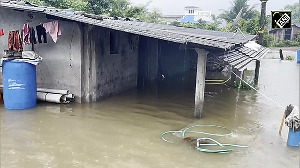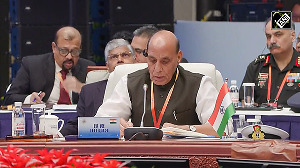Pakistan and Afghanistan on Friday began negotiations on a Strategic Partnership Agreement even as Kabul called on Islamabad to take more steps, including the release of Taliban detainees, to push forward the troubled peace process in the war-torn country.
Pakistan Foreign Minister Hina Rabbani Khar presented a draft of the Strategic Partnership Agreement (SPA) to her Afghan counterpart Zalmai Rassoul during a meeting at the Foreign Office.
Both ministers told a news conference after their talks that they would like the pact to be signed as soon as possible though Rassoul made it clear that such an agreement required "full trust" between the two sides.
"The issue is that you cannot sign a SPA where there is not full trust and confidence between the two countries. I think you are reaching that grade now," he said in response to a question about conditions set by President Hamid Karzai for the pact.
Rassoul said his discussions with Khar marked the "first step" in paving the way for signing the agreement.
Khar said that both sides had started the journey towards finalising the agreement, which was first suggested by Karzai during a trilateral meeting with the US in September.
Karzai had angered Pakistan in October by demanding that it should stop backing terrorists as a condition for negotiating the SPA.
At that time, the Foreign Office had described Karzai's comments as "entirely misplaced and without any basis".
During the news conference, Rassoul acknowledged that a list of Afghan Taliban detainees whose release has been sought by Kabul had figured in his talks with Khar. However, he did not give details.
Referring to the release of about a dozen mid-ranking Taliban detainees by Pakistan earlier this month, Rassoul said: "This is a time for continued action. Therefore I hope that we will continue with implementing other concrete measures in a timely manner in pushing the peace process forward as outlined in the peace process roadmap we have shared with the government of Pakistan".
He said that "all those who can help advance the peace process (should) go free" so that the "Afghan government and Taliban can engage".
While Kabul will continue working with all its allies to facilitate reconciliation, the peace process must be led by the Afghans, Rassoul said.
"The peace process should be Afghan-led and Afghan-owned. If not, there is no peace," he asserted.
Khar reiterated Pakistan's position that it is committed to backing an Afghan-led process.
"There is no doubt that Pakistan is walking the talk of supporting at all costs an Afghan-led, Afghan-driven and Afghan-owned process of peace and reconciliation," she said.
Issues like the release of prisoners, safe passage for those participating in the peace process, facilitation of contacts by Pakistan were "discussed thoroughly", she said.
Elaborating on Pakistan's role, Khar said Islamabad could not "be more than" a facilitator to "whatever future the Afghans choose for themselves".
Impressions that Pakistan had "favourites" in Afghanistan or had intentions of controlling the peace process were "historic hangovers", she contended.
Khar and Rassoul also announced that the two sides would operationalise a joint commission to address the issue of releasing prisoners held in both countries and work towards extending the Afghanistan-Pakistan Transit Trade Agreement to Tajikistan.
They said a conference of ulema (Islamic scholars) will be held in Kabul at the end of January to boost the Afghan peace process.
The two ministers said their discussions had also focused on narcotics control, steps to counter terrorism and extremism and tensions along the Afghanistan-Pakistan border caused by insurgent raids and shelling.
Rassoul said peace in both countries was closely linked and Pakistan had an "especially central and crucial role" in advancing the Afghan peace process.
He further said Afghanistan will not allow its soil to be used for terrorism against Pakistan.







